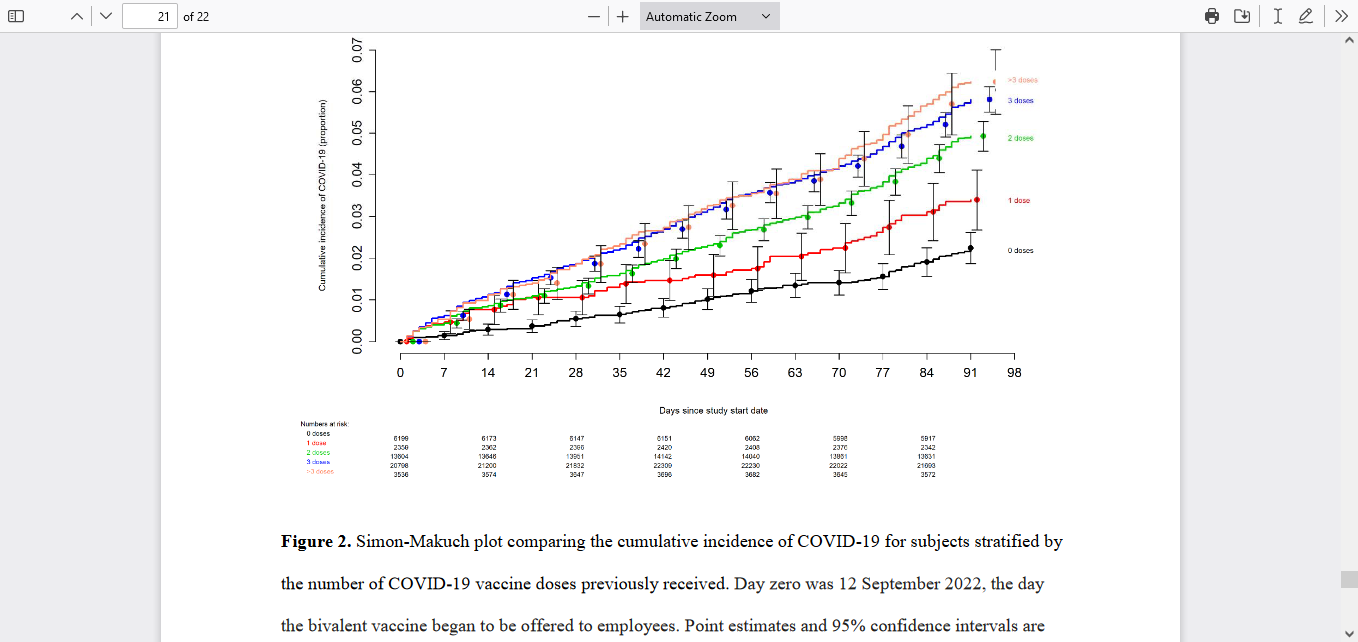Two new important medical research articles
On shows ivermectin works and the other shows vaccine boosters do not work
I spend much time reading medical research articles so that I can select a few that I deem especially significant to inform my subscribers about.
SARS-CoV-2 Spike Protein Induces Hemagglutination: Implications for COVID-19 Morbidities and Therapeutics and for Vaccine Adverse Effects
This article is all about blood clots formed by red blood cells. Buried in the article are findings that ivermectin can prevent and cure these blood problems that other research has found explains many harmful health impacts from spike proteins in COVID infection and COVID mRNA vaccines.
Here Is the abstract with IVM findings highlighted.
Abstract
Experimental findings for SARS-CoV-2 related to the glycan biochemistry of coronaviruses indicate that attachments from spike protein to glycoconjugates on the surfaces of red blood cells (RBCs), other blood cells and endothelial cells are key to the infectivity and morbidity of COVID-19. To provide further insight into these glycan attachments and their potential clinical relevance, the classic hemagglutination (HA) assay was applied using spike protein from the Wuhan, Alpha, Delta and Omicron B.1.1.529 lineages of SARS-CoV-2 mixed with human RBCs. The electrostatic potential of the central region of spike protein from these four lineages was studied through molecular modeling simulations. Inhibition of spike protein-induced HA was tested using the macrocyclic lactone ivermectin (IVM), which is indicated to bind strongly to SARS-CoV-2 spike protein glycan sites. The results of these experiments were, first, that spike protein from these four lineages of SARS-CoV-2 induced HA. Omicron induced HA at a significantly lower threshold concentration of spike protein than the three prior lineages and was much more electropositive on its central spike protein region. IVM blocked HA when added to RBCs prior to spike protein and reversed HA when added afterward. These results validate and extend prior findings on the role of glycan bindings of viral spike protein in COVID-19. They furthermore suggest therapeutic options using competitive glycan-binding agents such as IVM and may help elucidate rare serious adverse effects (AEs) associated with COVID-19 mRNA vaccines, which use spike protein as the generated antigen.
Effectiveness of the Coronavirus Disease 2019 (COVID-19) Bivalent Vaccine
The central finding from the Cleveland Clinic was that the new COVID boosters are not very effective and that the more shots a person has the more likely COVID infection happens.
Here is the abstract and other statements with some key findings highlighted.
Results.
Among 51011 employees, 20689 (41%) had had a previous documented episode of COVID-19, and 42064 (83%) had received at least two doses of a COVID-19 vaccine. COVID-19 occurred in 2452 (5%) during the study. Risk of COVID-19 increased with time since the most recent prior COVID-19 episode and with the number of vaccine doses previously received. In multivariable analysis, the bivalent vaccinated state was independently associated with lower risk of COVID-19 (HR, .70; 95%
C.I., .61-.80), leading to an estimated vaccine effectiveness (VE) of 30% (95% CI, 20-39%). Compared to last exposure to SARS-CoV-2 within 90 days, last exposure 6-9 months previously was associated with twice the risk of COVID-19, and last exposure 9-12 months previously with 3.5 times the risk. Conclusions. The bivalent COVID-19 vaccine given to working-aged adults afforded modest protection overall against COVID-19, while the virus strains dominant in the community were those represented in the vaccine.
Summary:
Among 51011 working-aged Cleveland Clinic employees, the bivalent COVID-19 vaccine booster was 30% effective in preventing infection, during the time when the virus strains dominant in the community were represented in the vaccine.
What was not highlighted was the finding that the more booster shots the greater the incidence of COVID infection.
“The association of increased risk of COVID-19 with higher numbers of prior vaccine doses in our study, was unexpected.”
“This is not the only study to find a possible association with more prior vaccine doses and higher risk of COVID-19. A large study found that those who had an Omicron variant infection after previously receiving three doses of vaccine had a higher risk of reinfection than those who had an Omicron variant infection after previously receiving two doses of vaccine. Another study found that receipt of two or three doses of a mRNA vaccine following prior COVID-19 was associated with a higher risk of reinfection than receipt of a single dose. We still have a lot to learn
about protection from COVID-19 vaccination, and in addition to a vaccine’s effectiveness it is important to examine whether multiple vaccine doses given over time may not be having the beneficial effect that is generally assumed.”
In this figure the higher the curve, the greater the number of boosters and on left axis the greater the level of COVID infection.






Thank you.
Joel, How much more evidence do we need? Linking tomorrow @https://nothingnewunderthesun2016.com/